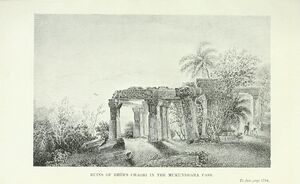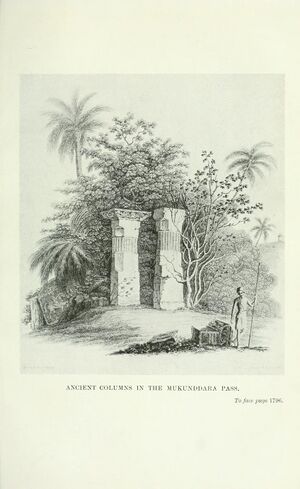Mukunddara


Mukunddara, 'Pass of Mukund', was an outlet between the Dekhan and northern India, has been a celebrated spot in past.
Origin of name
- Hara Rao Mukund Singh: According to James Tod [1] Mukunddara gets name from Hara Rao Mukund Singh (A.D. 1630-57), To this prince the chief pass in the barrier dividing Malwa from Haraoti owes its name of Mukunddarra - which gained an unfortunate celebrity on the defeat and flight of the British troops under Brigadier Monson, A.D. 1804. Mukund erected many places of strength and utility ; and the palace and petta of Anta are both attributable to him.
- Mukunda: Our view is that this pass was very ancient and looking to structures found here the name of the place may be attributed to Mukunda, elder son of Jat ruler Maharaja Kartik, son of Chandrasena, born in Yuti vansha of Bundi area in Rajasthan around 4-6th century . Mukunda was elder brother of Daruka but we find no mention of him in history. Mukunda's name is mentioned as elder son of Maharaka Kartik in a Pali Inscription obtained by James Todd about Jat tribe at village Ramchandrapura 3 kos (6 miles) east of Bundi state, which he sent to Asiatic Society London.
Description by James Tod
James Tod[2] writes that We continued our march from this Pass and reached the Durra, outside of which we found the old Regent encamped, and whence we issued on our tour just three weeks ago. It was by mere accident that, some distance up the valley, (a continuation of that we had just quitted,) we heard of some ruins, termed the " Chaori of Bheem," one of the most striking remains of art I had yet met with. It is the fragment only of a quadrangular pile, of which little now remains, the materials having been used by one of the Kotah princes, in erecting a small palace to a Bhilni concubine. The columns possess great originality, and appear to be the connecting link of Hindu and Egyptian architecture. Not far from the Caaori, where, according to local traditions, the Pandu Bheem celebrated his nuptials, are two columns, standing without relation to any other edifice ; but in the lapse of ages the fragments appertaining to them have been covered with earth or jungle. At every step we found joojarhs, or funeral stones ; and as this "Pass of Mukund" must, as the chief outlet between the Dekhan and northern India, have been a celebrated spot, it is not unlikely that in remote ages some city was built within its natural ramparts. Throughout this town, we found many traces of the beneficent but simple legislation of the Hara princes ; and when the Regent set up his pillar, prohibiting chiefly his own violence, he had abundant formulas to appeal to. We have already alluded to this circumstance in the sketch of his biography, and we may here insert a free translation of the ordinance we found engraved in the Pass, and which is recorded throughout Harouti.
- "Maharaj Maharao-ji Kishore Sing, ordaining! To all the merchants (mahajins), traders, cultivators, and every tribe inhabiting Mokundurra. At this time, be full of confidence ; trade, traffic, exchange, borrow, lend, cultivate, and be prosperous ; for all dind (contribution) is abolished by the Durbar. Crimes will be punished according to their magnitude. All officers of trust, Patels, Patwarris, Sasunis (night-guards), and mootstudies (scribes), will be rewarded for good services, and for evil. None of them shall be guilty of exactions from merchants or others : this is a law sworn to by all that is sacred to Hindu or Mooslem. Ordained from the royal mouth, and by command of Nanah-ji (grandsire) Zalim Sing, and uncle Madhu Sing. Asoj the 10th, Monday S. 1877 (A.D. 1821)."
Having halted a few days, we returned to Kotah by the towns of Puchpahar and Anandpur ; both large and thriving, situated upon the banks of fine pieces of water.
External links
References
- ↑ Annals and Antiquities of Rajasthan, Volume III,
- ↑ James Todd Annals/Personal Narrative,Vol.II,pp.677

